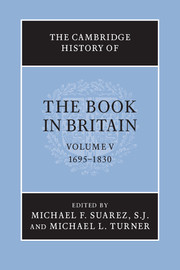Book contents
- Frontmatter
- Introduction
- PART I THE QUANTITY AND NATURE OF PRINTED MATTER
- 1 Towards a bibliometric analysis of the surviving record, 1701–1800
- 2 Printed ephemera
- PART II ECONOMIC, LEGAL AND CULTURAL CONTEXTS
- PART III THE TECHNOLOGIES AND AESTHETICS OF BOOK PRODUCTION
- PART IV THE BOOK TRADE AND ITS MARKETS
- V BOOKS AND THEIR READERS
- Abbreviations used in bibliography
- Bibliography
- Index
- Frontispiece
- Plate section
- References
1 - Towards a bibliometric analysis of the surviving record, 1701–1800
from PART I - THE QUANTITY AND NATURE OF PRINTED MATTER
Published online by Cambridge University Press: 28 September 2010
- Frontmatter
- Introduction
- PART I THE QUANTITY AND NATURE OF PRINTED MATTER
- 1 Towards a bibliometric analysis of the surviving record, 1701–1800
- 2 Printed ephemera
- PART II ECONOMIC, LEGAL AND CULTURAL CONTEXTS
- PART III THE TECHNOLOGIES AND AESTHETICS OF BOOK PRODUCTION
- PART IV THE BOOK TRADE AND ITS MARKETS
- V BOOKS AND THEIR READERS
- Abbreviations used in bibliography
- Bibliography
- Index
- Frontispiece
- Plate section
- References
Summary
Introduction
In the pages that follow, I tender a preliminary analysis of the surviving record of eighteenth-century imprints in Britain and Ireland based on an ordered sampling of the English short-title catalogue (ESTC, formerly the Eighteenth-century short-title catalogue). Hence, this investigation is subject to both the remarkable possibilities and the limitations afforded by the ESTC. Like other union catalogues, the ESTC was not designed to be used as a statistical tool; yet, the availability of such a wealth of data has made such studies – for all their difficulties and shortcomings – an important feature of book-historical and bibliographical scholarship in recent decades. Among the problems one encounters in using the ESTC for data collection and analysis is that it is not a stable database, but rather is constantly growing and changing as it is updated and subject to improvements, additions and corrections. The data in this study were collected between 2002 and 2004; while every effort has been made to control for the shifting nature of the database, such accommodations have not always been possible, especially since neither corrections nor additions to the ESTC are marked as new. (At times, one may feel rather like Walter Shandy compiling the Tristapaedia.) Nevertheless, although a significant number of periodicals were added to the database during this period (and since then as well), the basic trends in the data and their analysis appear to be largely reliable.
- Type
- Chapter
- Information
- The Cambridge History of the Book in Britain , pp. 37 - 65Publisher: Cambridge University PressPrint publication year: 2009
References
- 9
- Cited by

